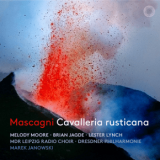 Pietro Mascagni: Cavalleria Rusticana; Melody Moore (Santuzza), Brian Jagde (Turiddu), Elisabetta Fiorillo (Lucia), Lester Lynch (Alfio), Roxana Constantinescu (Lola), MDR Radio Chor Leipzig, Dresdner Philharmonie, Marek Janowski; 1 SACD Pentatone Classics PTC5186772; Aufnahme 03/2019, Veröffentlichung 10/04/2020 (66'06) - Rezension von Remy Franck
Pietro Mascagni: Cavalleria Rusticana; Melody Moore (Santuzza), Brian Jagde (Turiddu), Elisabetta Fiorillo (Lucia), Lester Lynch (Alfio), Roxana Constantinescu (Lola), MDR Radio Chor Leipzig, Dresdner Philharmonie, Marek Janowski; 1 SACD Pentatone Classics PTC5186772; Aufnahme 03/2019, Veröffentlichung 10/04/2020 (66'06) - Rezension von Remy Franck

Wer heute eine Aufnahme von Mascagnis Cavalleria Rusticana auf den Markt bringt, stellt seine Einspielung in eine Reihe mit Mascagni selber (Gigli, Simionato), Serafin (Simionato, del Monaco), Erede (Tebaldi, Björling, Bastianini) und Karajan (Cossotto, Bergonzi, Guelfi). Wenn mich nicht einmal Sinopoli (Baltsa, Domingo, Pons), Muti (Caballé, Carreras, Manuguerra) und Levine (Scotto, Domingo) glücklich machten, was soll ich denn von dieser Einspielung sagen, außer, dass das Spiel der Dresdner Philharmonie an sich eigentlich ganz gut klingt, farbig und geschmeidig, aber das ist auch alles. In den schnellen 66 Minuten gelingt es Janowski nicht, das Orchester adäquat dramatisch werden zu lassen. Sein unverändert Gleichförmigkeit hervorrufendes Dirigat tötet die Italianità und die Spontaneität des Verismo ab wie ein Antiseptik-Gel den Corona-Virus.
Tebaldi und Callas haben zwar auch als Sopranistinnen die Rolle der Santuzza gesungen, aber das waren gestalterisch auch eminent großartige Sängerinnen. Ansonsten lebte die Rolle vor allem mit Mezzosopranistinnen auf. Wer Cossotto bei Karajan mit Melody Moore vergleicht, sieht den Graben, was sage ich, den Grand Canyon zwischen beiden Interpretinnen.
Brian Jagde singt den Turridu zwar ausdrucksvoll und leidenschaftlich und mit beachtlicher Kraft in der Höhe, aber leider bringt es Janowski nicht fertig, die Stimme zu tragen und richtig einzubinden, so dass der Sänger immer wieder durch mangelhafte Phrasierung und unsichere Rhythmik auffällt.
Lester Lynch als Alfio bleibt blass, Roxana Constantinescu verpasst den Charakter der Lola völlig (man fragt sich, was Turridu wohl an ihr finden soll) und bei der Rest-Stimmqualität von Elisabetta Fiorella ist es für unsere Ohren gut, dass Mascagni die Rolle relativ klein gehalten hat.
Zum Schluss noch eine positive Anmerkung: neben dem Orchester brilliert der Radiochor des MDR aus Leipzig. Leider reichen die positiven Seiten nicht aus, um zu verhindern, dass wir diese Aufnahme unter ‘ferner liefen’ klassieren müssen.
Whoever releases a new recording of Mascagni’s Cavalleria Rusticana will have it compared with Mascagni himself (Gigli, Simionato), Serafin (Simionato, del Monaco), Erede (Tebaldi, Björling, Bastianini) and Karajan (Cossotto, Bergonzi, Guelfi). If not even Sinopoli (Baltsa, Domingo, Pons), Muti (Caballé, Carreras, Manuguerra) and Levine (Scotto, Domingo) made me happy, what can I say about this recording, except that the playing of the Dresden Philharmonic actually sounds quite good in itself, colourful and smooth, but that’s all. In the fast 66 minutes Janowski does not succeed in making the orchestra adequately dramatic. His unvarying conducting, kills the Italianità and the spontaneity of the verismo like an antiseptic gel kills the corona virus.
Although sopranos Tebaldi and Callas sang the role of Santuzza, they were also eminently great singers in terms of their artistic expression. Yet, the role was more often successfully sung by mezzo sopranos. If you compare Fiorenza Cossotto with Melody Moore, you see the gap, what do I say, the Grand Canyon between the two singers.
Brian Jagde is an expressive and passionate Turridu, with considerable power in the high register, but unfortunately Janowski does not manage to adequately support and control the voice, so that Jadge’s singing all too often lacks precision. Lester Lynch as Alfio remains pale, Roxana Constantinescu misses the character of Lola completely (one wonders why Turridu has become her lover) and with the remaining voice quality of Elisabetta Fiorella it is good for our ears that Mascagni kept the role relatively small.
Finally a positive note: besides the orchestra, the Radio Choir of the MDR from Leipzig is brilliant. Unfortunately, the positive aspects are not enough to prevent us from having to classify this recording only into the ‘also ran’ category.






















